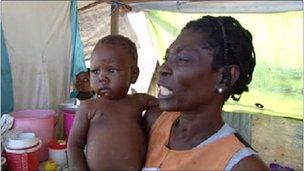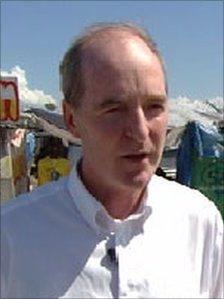Haitians fear cholera outbreak could spread to capital
- Published

Residents of the Haitian capital, Port-au-Prince, fear the cholera outbreak could reach there
Bierneme's home collapsed during January's earthquake, and now she is worrying about how to prevent her baby from catching cholera.
Bierneme lives in the largest of the 130,000 camps in Haiti which sprang up after the quake, next to the gigantic flagpole which is all that is left of the military airport set up by Haiti's infamous former leader, Papa Doc Duvalier.
Having endured political violence and natural disasters, now Haitians are coping with a cholera outbreak.
The former airport camp in the capital, Port-au-Prince, is teeming with 8,000 earthquake survivors - exactly the kind of crowded conditions in which cholera could flourish if the disease moves south from the Artibonite region.
So far, the only cases of cholera in the capital have been among people who contracted the disease elsewhere and then came to Port-au-Prince for treatment.
But Bierneme is anxious. She cradles her baby, and tells me she doesn't have enough money to pay for chlorine pills to purify the water to make it safe to drink.
As we talk, she's watching a performance in the middle of the camp by graduates of Haiti's own Fame Academy school.
They're chanting and singing, explaining to the crowd that people can contain the spread of cholera by washing their hands, and using clean toilets. It's a public information campaign organised by the International Organisation for Migration (IOM), a UN agency responsible for co-ordinating the management of the camps.
Slum illness
Leonard Doyle, the IOM spokesperson in Haiti, says his organisation is tracking the mobile phones of those who fled the Artibonite region after the cholera outbreak began. They're going all over the country. The IOM is texting them with cholera-prevention advice, hoping this will help contain the spread.

Leonard Doyle says the IOM is trying to contain the spread of the disease
Should the disease take hold in Port-au-Prince, Leonard Doyle says those living in the camps would have access to chlorine, to clean water, and to medical advice, but not so the people living in the slums created by Papa Doc Duvalier.
"The great problem and the great fear is the slums, where people have lived for decades in abject misery in shacks, with no sanitation. Nobody's in touch with them - cholera would be a time bomb there," he says.
In Cite Soleil, the most notorious slum in Port-au-Prince, I meet Jocelin Pierre. Piles of rubbish sit on the street as we talk. His wife has severe diarrhoea, and he's worried that she may have contracted cholera. She's in a bad hospital, he tells me, and he says he doesn't have the money to move her to a good one.
Diarrhoea is not uncommon in Port-au-Prince, because so many people live in cramped conditions. But as acute diarrhoea is a symptom of cholera, Jocelin is deeply concerned.
The Artibonite river is believed to be the source of the cholera outbreak. The first cases were among people who lived and worked along the banks of the river.
In Port-au-Prince, a river running through one camp is being cleared of all the rubbish floating in it. Having relied on rivers as a life source, now Haitians are fearful of the contamination the water may be carrying.
- Published27 October 2010
- Published26 October 2010
- Published25 October 2010
- Published25 October 2010
- Published25 October 2010